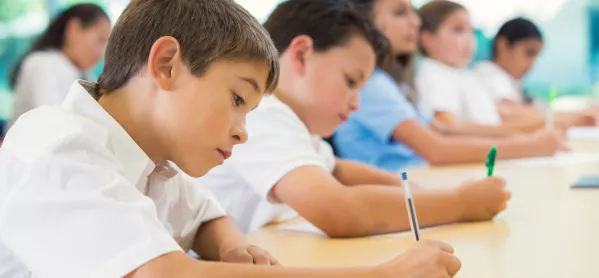
Let’s not pretend that KS2 Sats help with transition

Another day, another announcement from the Department for Education. It’s like an Advent calendar gone horribly wrong.
I confess, I have diverted my daily briefing from the DfE into a folder, and check it once a week. I reckon that if it is something worth knowing, I’ll find out about it from Twitter.
So behind yesterday’s Advent window was the announcement about the changes to primary assessments this year - a third of the way through the year.
Silence on EYFS. Well, what else is to be expected, for what I - and royalty now - consider the most important age group.
Phonics will go ahead. Keep reading those fun “alien” words, kids! Tlapcrap fipple sonnense.
Gone are key stage 1 tests: double thumbs up from me.
Coronavirus: No key stage 2 league tables this year
And then we come to key stage 2 Sats. We now have longer to administer them, which is helpful. It would also have been helpful not to schedule them to coincide with Eid, which they’ve known for a few years, too, but let’s not be petty here.
Certainly, the news that Sats results will not be published in league tables is very welcome indeed. Long have we known about the destructive nature of this accountability measure, pitting neighbouring schools against one another in an arena of public shame.
Will anyone miss them? I suppose The Sunday Times may have to find something else to publish, in place of their annual “Look, my school is better than your school” supplement. Perhaps a lovely article about how brilliant schools have been during a pandemic? Just a suggestion.
So what purpose will Sats serve if there are no league tables? We are told that the tests are important for “assisting with pupils’ transition to secondary schools”.
Thank you, DfE: I genuinely laughed out loud when I read that. Does anyone really believe that those results are used for anything other than targets for key stage 4? Let’s not pretend otherwise. We all know that secondary schools are dubious about the information they receive from primaries and retest on entry.
Really useful transition information
I would absolutely love it if, instead of key stage 2 Sats, we were to have really useful transition information for our secondary schools. What a huge difference this could make to the lives of pupils - and to the lives of secondary teachers, if they had the extensive knowledge that we in primary have about them.
If I were in charge of redesigning key stage 2 assessment, with the aim of making it genuinely useful for transition to secondary, I would do the following. (That sentence was written in honour of the now lost hours Year 6 pupils across the land would have spent learning the subjunctive.)
Each pupil would transfer to secondary with a holistic portfolio. It would contain:
- Pastoral information.
- Recommendations around any particular friendship issues, if there is a cohort transferring to the same school.
- A short report on behaviour and attitude to learning.
- A short report on their wider curriculum strengths. Are they an artist? Dancer? Musician? Amazing team-sports person?
- A handwriting sample, so that teachers can see what they are capable of and hold them to standard.
- A piece of their highest-quality writing - for the same reasons above.
- A piece of writing that has been administered without any input, showing what can they do by themselves.
And I would absolutely continue with standardised testing. Each pupil would complete the following:
- Mental maths test - it is so necessary to calculate and be able to recall key facts in your head quickly and accurately.
- Written arithmetic test - as above, but on paper.
- Maths reasoning paper - as maths is more than straight facts and calculation recall.
- A grammar and punctuation test.
These tests would be marked, but instead of a meaningless number assigned to the summative assessment, they would contain question-level analysis, so that the secondary staff can actually see what they can and cannot do.
Introduce an individual reading profile
My final point, however, is probably where I would start my campaign: get rid of the reading paper and replace it with an individual reading profile.
Each pupil would have their reading age calculated and then, if they fell below age-related expectations, would have a further diagnostic assessment to show which areas needed to be addressed.
In addition, the teacher could write a short paragraph about their knowledge of the pupil’s attitude towards and enjoyment of reading.
Is it too much information? Some might think so.
But imagine the power of that information in the Year 7 tutor and teachers’ hands. Imagine how much time would be saved once they no longer had to try to work out these things for themselves. Time that could be spent…teaching.
Ruth Luzmore is headteacher at St Mary Magdalene Academy, in North London. She tweets @RLuzmore
You need a Tes subscription to read this article
Subscribe now to read this article and get other subscriber-only content:
- Unlimited access to all Tes magazine content
- Exclusive subscriber-only stories
- Award-winning email newsletters
- Unlimited access to all Tes magazine content
- Exclusive subscriber-only stories
- Award-winning email newsletters
You need a subscription to read this article
Subscribe now to read this article and get other subscriber-only content, including:
- Unlimited access to all Tes magazine content
- Exclusive subscriber-only stories
- Award-winning email newsletters
- Unlimited access to all Tes magazine content
- Exclusive subscriber-only stories
- Award-winning email newsletters